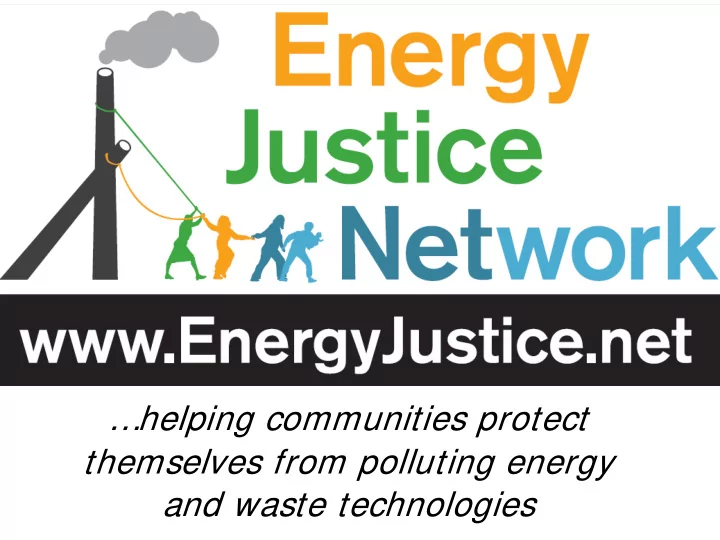

…helping communities protect themselves from polluting energy and waste technologies
Why are waste coal piles a problem? • Look bad • Leach iron, manganese and aluminum pollution into waterways • Cause acid drainage when exposed to water • Sometimes catch fire
How is waste coal supposed to be managed? The 1977 Surface Mining Control and Reclamation Act (SMCRA) recognizes waste coal as potential “toxic forming material” due to the high sulfur levels that contribute to acid drainage. The SMCRA law states that burying waste coal is the best way to reduce acidity from these piles.
The Power Industry’s Answer to Waste Coal Piles: Fluidized Bed Combustors • FBC boiler technology over 30 years old • Can be used to burn a wide range of fuels, including very poor fuels like waste coal • Started to be used to burn waste coal in late 1980s
Waste Coal Burners in Pennsylvania 1. Westwood 11. Scrubgrass 2. Gilberton - Rich Memorial 12. Colver 3. Wheelabrator-Frackville 13. Northhampton Generating 4. NEPCO - Kline Twp Cogen 14. Seward 5. Mount Carmel Cogen Proposed Facilities: 6. St Nicholas Cogen 15. Sithe / River Hill Power 7. Ebensburg Power Co 16. Robinson Power - Beech Hollow 8. Cambria CoGen 17. Wellington Development - Greene Energy Resource Recovery Project 9. Panther Creek 18. Sithe Global Power LLC – Somerset Power 10. Colmac - Piney Creek
Poor Economics • Large volumes of low-Btu fuel requires extra handling (more fuel; more ash) • Higher maintenance and repair costs ($1-3 million/year in repairs for smaller plants) • More complicated than normal pulverized coal power plants
Creating Cancer Polycyclic aromatic hydrocarbons (PAHs): group of over 100 different chemicals that are formed as byproducts of combustion Most PAHs are known to cause cancer in animals and are suspected to cause cancer, birth defects and a wide variety of other health problems in humans. Fluidized bed combustors form PAH more than normal coal burners due to: • use of limestone injection • low oxygen levels • lower combustion temperature range • low-rank coal • higher sulfur levels in fuel • higher chlorine levels in fuel Benzo(a)pyrene
Particulate Matter (soot) Washington and Allegheny Counties have unhealthy levels of fine particulate matter (soot) in the air, contributing to heart attacks, asthma, breathing problems, premature death and other health problems. New federal rules went into effect on April 5 th , 2005 requiring Pennsylvania to develop a plan to reduce these to “safe” levels by 2010 or 2015. The permit was issued on April 4 th , avoiding these new rules applying to this power plant.
Global Warming / Climate Change Pennsylvania already emits 1% of the entire world’s greenhouse gas emissions. “N2O has a Global Warming Potential 296 times that of CO2.” “N2O is emitted from fluidized bed coal combustion… N2O emission from the FBC is equivalent to… an increase of about 15% in CO2 emissions for an FBC boiler ” -National Coal Council, May 2003
Air Pollution: 36% Dirtier than New Coal Plants Beech Hollow Longview % increase data below is in pounds per trillion Btu Air Pollutant 245,000 149,984 +63% Sulfur Dioxide (SO 2 ) 80,000 79,980 +0% Nitrogen Oxides (NOx) 12,000 17,991 -33% Fine Particulate Matter (PM10) 150,000 110,075 +36% Carbon Monoxide 6,000 4,007 +50% Volatile Organic Compounds 3,000 7,491 -60% Sulfuric Acid 2,900 0.35 +828,433% Hydrochloric Acid 2,540 0.35 +725,580% Hydrofluoric Acid Total 501,440 369,530 +36% Fuel Waste Coal Coal Washington / PA Monongalia / WV Proposed County / State
What will be coming out of the smokestack? LACK OF TESTING Technology exists to continuously monitor the following pollutants. This technology will NOT be used for: Sulfuric Acid Hydrofluoric Acid Hydrochloric Acid Volatile Organic Compounds Arsenic Beryllium Lead Cadmium Chromium VI Nickel Ammonia Dioxins & furans Polycyclic Aromatic Hydrocarbons (PAHs)
Waste Coal: 55% the Energy Value of Coal
Waste Coal: Highest Mercury Content of Any Fuel
Low Energy Value = More Ash 100 tons of waste coal 85 tons of waste coal ash
Western PA Waste Coal Most Contaminated
Most Mercury Per Megawatt: 6.3 Times More than Coal
Waste Coal Ash Leaches & Damages Groundwater Revloc Mine Job 54 Mine -arsenic -sulfate -iron -iron -manganese Kedron Mine Pilot Project -acid drainage problem got worse -sulfate -iron Albright Mine -aluminum -arsenic -manganese -selenium -lime leached out at toxic levels -molybdenum Ernest Mine Laurel Land Development / McDermott -arsenic Mine -aluminum -spring damaged -nickel -iron Maple Mine / Rail Yard Site -manganese -arsenic -acid drainage problem got worse -cadmium (acidity more than tripled) -sulfate
The Alternatives for Waste Coal • Filling Abandoned Mines • Grading and Revegetating • American Beachgrass Before After
FOR MORE INFO: www.TruthAboutGob.org (waste coal in SW PA) www.EnergyJustice.net (waste coal & clean energy solutions…) www.ActionPA.org/energy/ (PA’s Dirty Energy Legacy) www.ActionPA.org/cleanenergy/ (PA’s New “Alternative” Energy Law)
Jobs in Energy Sector For every $1 million invested, how many jobs are created? 21.5 Energy Efficiency (Apollo Alliance) 5.9 Renewable Energy (Gamesa wind production plant in Ebensburg) 0.25 Waste Coal (GERRP) “Energy efficiency is far more labor intensive than generation… These jobs include installation, ongoing operations and maintenance of building systems, and new manufacturing to meet the increased demand for energy efficient appliances and building systems.” ( New Energy for America – The Apollo Jobs Report: Good Jobs & Energy Independence )
We Don’t Need the Electricity West Virginia and Pennsylvania are the 1 st and 3 rd largest exporters of electricity. Pennsylvania produces 45% more electricity than is consumed in-state. West Virginia produces more than 3 times more power than is used in-state. Exports from these two states alone are enough to meet the needs of all 16 states east of the Rocky Mountains which don’t produce enough of their own electricity.
Mike Ewall, Esq. Founder & Director 215-436-9511
Recommend
More recommend